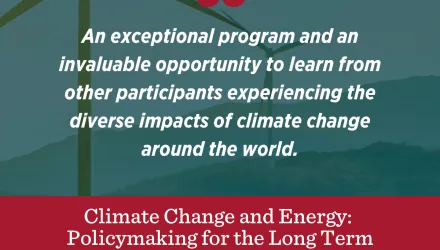The research for this report by the Energy Technology Innovation Policy research group was generously supported by a grant from the Doris Duke Charitable Foundation.
The United States and the world need a revolution in energy technology—a revolution that would improve the performance of our energy systems to face the challenges ahead. A dramatic increase in the pace of energy innovation is crucial to meet the challenges of:
- Energy and national security, to address the dangers of undue reliance on dwindling supplies of oil increasingly concentrated in some of the most volatile regions of the world, and to limit the connection between nuclear energy and the spread of nuclear weapons;
- Environmental sustainability, to reduce the wide range of environmental damages due to energy production and use, from fine particulate emissions at coal plants, to oil spills, to global climate disruption; and
- Economic competitiveness, to seize a significant share of the multi-trillion-dollar clean energy technology market and improve the balance of payments by increasing exports, while reducing the hundreds of billions of dollars spent every year on importing oil.
In an intensely competitive and interdependent global landscape, and in the face of large climate risks from ongoing U.S. reliance on a fossil-fuel based energy system, it is important to maintain and expand long-term investments in the energy future of the U.S. even at a time of budget stringency. It is equally necessary to think about how to improve the efficiency of those investments, through strengthening U.S. energy innovation institutions, providing expanded incentives for private-sector innovation, and seizing opportunities where international cooperation can accelerate innovation. The private sector role is key: in the United States the vast majority of the energy system is owned by private enterprises, whose innovation and technology deployment decisions drive much of the country’s overall energy systems. Efficiently utilizing government investments in energy innovation requires understanding the market incentives that drive private firms to invest in advanced energy technologies, including policy stability and predictability.
The U.S. government has already launched new efforts to accelerate energy innovation. In particular, the U.S. Department of Energy is undertaking a Quadrennial Technology Review to identify the most promising opportunities and provide increased coherence and stability. Our report offers analysis and recommendations designed to accelerate the pace at which better energy technologies are discovered, developed, and deployed, and is focused in four key areas:
- Designing an expanded portfolio of federal investments in energy research, development, demonstration (ERD&D), and complementary policies to catalyze the deployment of novel energy technologies;
- Increasing incentives for private-sector innovation and strengthening federal-private energy innovation partnerships;
- Improving the management of energy innovation institutions to maximize the results of federal investments; and
- Expanding and coordinating international energy innovation cooperation to bring ideas and resources together across the globe to address these global challenges.
The photographs in the body of the text are from the report launch event, which was held on November 22, 2011, at the American Association for the Advancement of Scoience (AAAS) headquarters in Washington, D.C.
Photographs by Sharon Wilke
"Transforming U.S. Energy Innovation"—a policy brief based on this report may be downloaded here: http://belfercenter.ksg.harvard.edu/publication/21527/
- Full text of Transforming U.S. Energy Innovation (5.7 MB PDF)
- Executive Summary (1.5 MB PDF)
- Appendices (5.6 MB PDF)
- Addendum to Chapter 4 (16.6 KB PDF)
- Harvard ERD3 Commercial Building Results (277 KB XLSX)
- Harvard DOE Assistance Posting (41.6 KB XLS)
- Harvard ERD3 Vehicles Survey Results (26 KB XLSX)
- Harvard ERD3 Fossil Results (25 KB XLSX)
- Harvard ERD3 Bioenergy Survey Results (22 KB XLSX)
- Harvard ERD3 Solar PV Results (24 KB XLSX)
- Harvard ERD3 Nuclear Results (35 KB XLSX)
- Harvard ERD3 Energy Storage Results (33 KB XLSX)
Diaz Anadon, Laura, Matthew Bunn, Gabe Chan, Melissa Chan, Charles Jones, Ruud Kempener, Audrey Lee, Nathaniel Logar and Venkatesh "Venky" Narayanamurti. “Report: Transforming U.S. Energy Innovation.” Energy Technology Innovation Policy Project, Belfer Center, November 2011





















